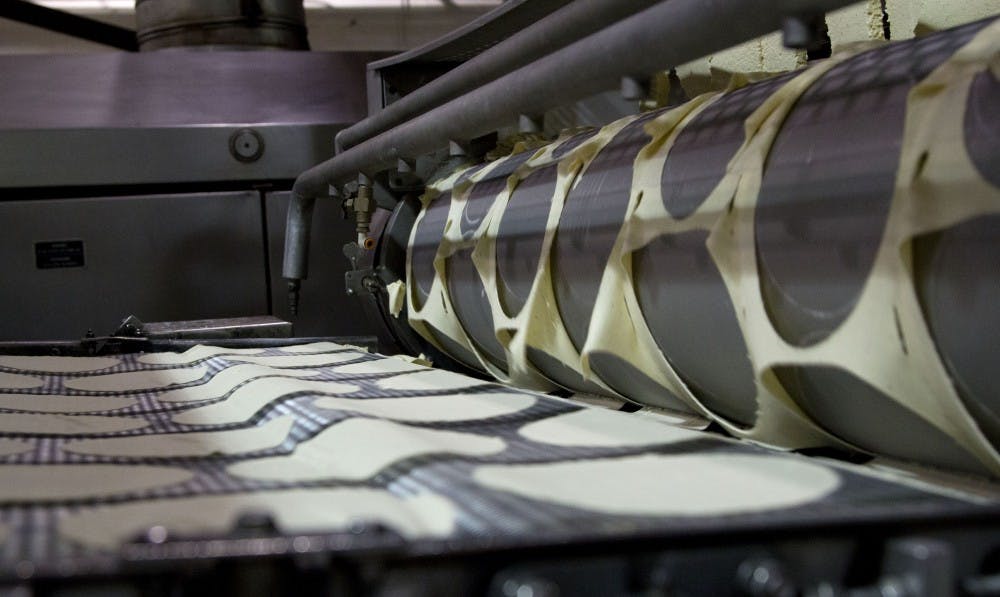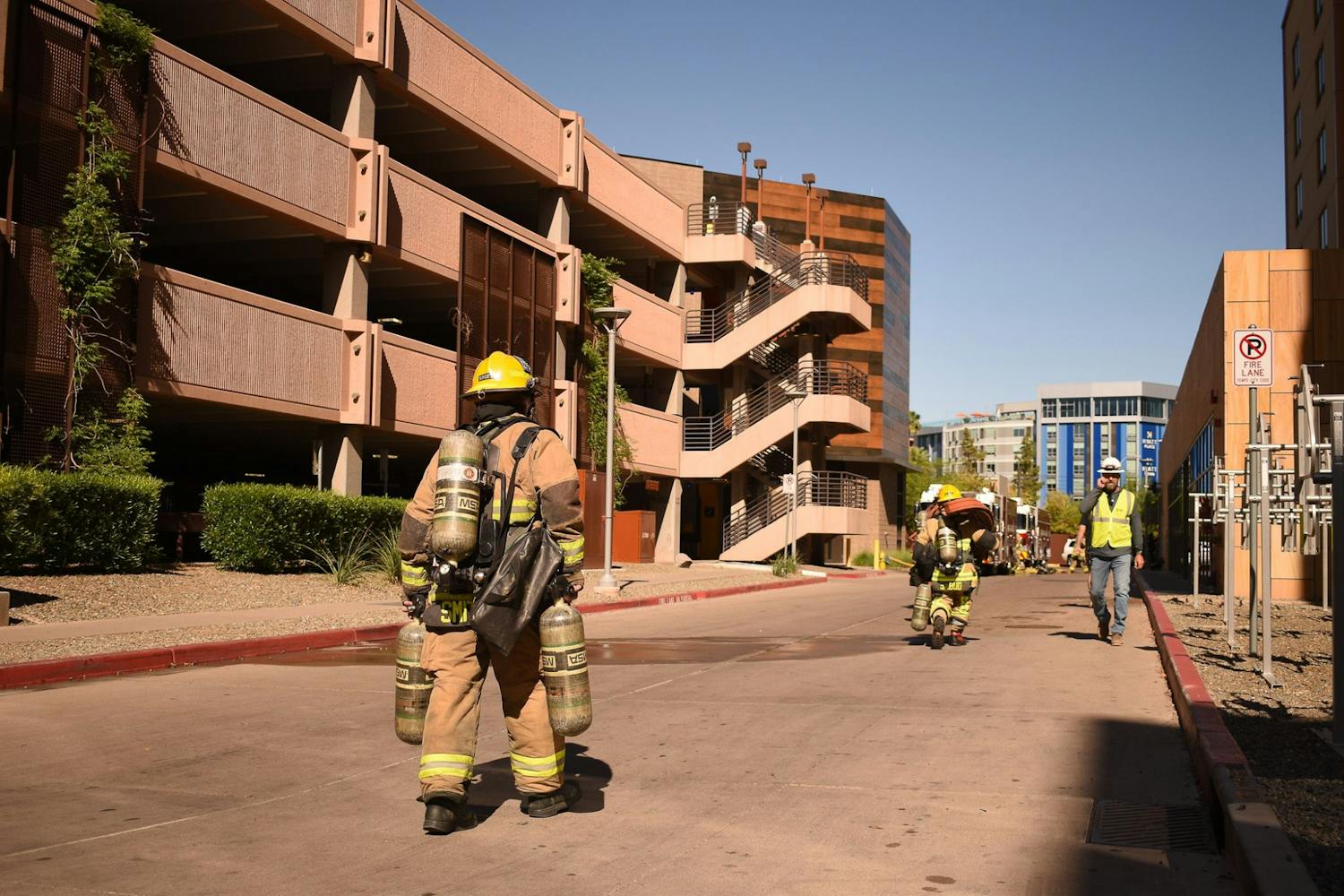This is part one of three in the series, Assessing Aramark.
 Taylor Place’s Devil’s Greens is located on the first floor of Taylor Place at the ASU downtown campus. The restaurant is owned and operated by Aramark, the company in charge of the food service contract for the University. (Photo by Ana Ramirez)
Taylor Place’s Devil’s Greens is located on the first floor of Taylor Place at the ASU downtown campus. The restaurant is owned and operated by Aramark, the company in charge of the food service contract for the University. (Photo by Ana Ramirez)
As ASU moves forward in its sustainability efforts, questions are being raised about its long-term partnership with international food service conglomerate Aramark, a company that has been suspected of “greenwashing.”
The complaint of “greenwashing,” or dishonestly marketing friendly environmental practices, leaves many questions about the impact on the University’s sustainability efforts with food sourcing.
Meanwhile, other large public universities have found alternatives to contracting food services.
In 2011, ASU made the decision to extend the food service contract for the Memorial Union and the dining halls to Aramark until at least 2024.
As students, professors and administrators, attempt to define and develop a sustainable food system with Aramark, there seems to be no clear consensus.
Aramark district manager Brandi Heatherly said the company’s priority in its service is to align itself with the sustainability goals that ASU sets.
“We don’t manage supply chain here locally,” Heatherly said, “but when we find a need for an item, we try as best we can to source it locally.”
Heatherly said more specific sourcing information could be obtained from Aramark’s corporate office in Philadelphia, but spokeswoman Karen Cutler refused multiple attempts for a phone interview and instead sent an email statement, which read:
“… At ASU, (Aramark) work(s) with a number of local, regional and national growers, producers and distributors. We aim to source as much food as we can locally (within a 250-mile radius) and within the region when available. This varies depending on the quantity of product needed to serve the campus and seasonal availability.”
Aramark sustainability manager Katrina Shum said sustainability at ASU hasn’t been an easy path to navigate, because there are so many individuals and groups with varying opinions on which direction is best.
“We need to get a better idea of what the University as a whole is looking for, rather than just listening to who is yelling at us the loudest,” she said.
Business as Usual
The Office of University Sustainability Practices, which is in charge of overseeing the Global Institute of Sustainability’s principles in practice guidelines, is happy with the sustainability efforts being made by Aramark, USP director Nick Brown said.
“I think they do really fine work,” Brown said, “They are really good partners with ASU, and they are proactive in their sustainability efforts.”
Some students and local farmers disagree with Brown and the USP and suspect Aramark of dishonestly marketing friendly environmental practices, or “greenwashing,” its sustainability efforts at ASU.
Real food ASU officer Shaili Parekh said ASU likes to maintain an image of sustainability, but outsourcing its food service operations can often conflict with this image.
“You can see the effort to maintain that sustainable image through the different events that we have and through some of the greenwashing that Aramark does, like on their website, but for the most part, their sourcing probably isn't sustainable and probably isn't local,” she said.
The website to which Parekh is referring is Aramark and ASU’s Sun Devil Dining sustainable food and dining web page, which poses the question, “Do you ever wonder where and how your food is grown?”
According to the site, ASU Sun Devil Dining “strive(s) to make the path from field to fork as sustainable as possible…”
The site then lists 17 local food producers, who it claims have been partners in local and sustainable sourcing.
However, of the 17 partners, seven say they have not or do not do business with Aramark, while two others are closed and one is no longer located in Arizona.
Neal Brooks, a farmer with Abby Lee Farms, one of the providers listed on the website, said he does not know why his farm is listed.
“Aramark, that’s just such a crock of sh-t,” he said. “They list us on the website, but we never sold them one penny.”
Brooks said many large companies like Aramark like to use the names of local farms to promote their efforts in sustainability but aren’t willing to engage in sustainable practices such as sourcing locally, because it is cheaper to get food from larger, non-local farms.
“It’s all a big lie,” he said. “They want all the credit for being sustainable. They want your name and your picture for their websites, but after that, they won’t pay a penny more or give you a break. They just go right back to business as usual.”
Sunizona Family Farms owner Janice Smith said she, nor her distributor, currently sell to Aramark either, despite being listed on the website and despite having several delivery trucks and the capability to deliver local food around the Valley.
Smith said Sunizona Family Farms provides excellent quality and is cost competitive, but believes it is difficult for large corporate food service providers to engage with local farmers on a meaningful level.
“At different times, we have encouraged them to source from us, but they probably find it easier to get everything from one source than to go to different farmers,” she said.
Smith said with a large corporation like Aramark, the principles in practice guidelines can get tricky, because “sometimes something gets posted on your website that your doing it, and it looks nice on the website, but then a ways down the pipeline, someone else is doing the ordering, and it’s just easier to get it from somewhere else.”
 David Vose, owner of Blue Sky Organic Farms, has farmed in Arizona since 1995. Though they are listed on Aramark's website as a food provider, a spokeswoman for the farm said they have not worked with Aramark in at least three years. (Photo by Ana Ramirez)
David Vose, owner of Blue Sky Organic Farms, has farmed in Arizona since 1995. Though they are listed on Aramark's website as a food provider, a spokeswoman for the farm said they have not worked with Aramark in at least three years. (Photo by Ana Ramirez)Blue Sky Organic Farms in Litchfield, Ariz., is also listed on the website.
Sara Dolan, a spokeswoman for the farm said Blue Sky has not worked with Aramark for at least three years.
She said Blue Sky provides all of the Whole Foods grocery stores in Arizona with organic food, and thus is capable of producing large quantities.
“I can produce a huge amount of organic food, and ASU would be a very lucrative contract for us,” she said.
Dolan said many large food providers like Aramark have contracts with corporate farms, and they buy in such large volumes that they get large reductions in price. Local farmers usually can’t compete with these prices, she said.
Queen Creek Olive Mill, Briggs and Eggers (listed on the website as Briggers and Eggers), Greer Farms (previously listed as Geer Farms), and Greenhouse Wilcox are also listed on the website, but all said they do not, to their knowledge, work with Aramark in any capacity.
Meanwhile, La Bella Pasta is closed, and Berto’s Gelato is in the process of being taken over by another company. Neither provide for Aramark but are listed on the website.
 Aramark has listed several local farms on their website, but many say they do not provide the company with food.
Aramark has listed several local farms on their website, but many say they do not provide the company with food.The website updated in early March 2013, and the spelling of Geer farms changed to Greer Farms. The provider Local Natural Foods was added.
Another local sustainable partner listed on the website, Redbird Chicken, no longer has a local processing plant. Instead, the chicken comes from Missouri and is processed in Colorado, spokesman Lloyd Lister said.
Roman Gonzales, a spokesman for Taylor Farms, which is also listed on the site, said Taylor Farms does provide Aramark with food but only grows in Arizona for four months of the year. It works out of Salinas, Calif., for the rest of the year.
Shamrock Farms, also listed, confirmed that it partners with Aramark. The company was the target of a United States Dairy Association investigation because of inorganic practices and confining cows for weeks, according to a 2011 article by organic food watchdog group the Cornucopia Institute.
Representatives from Duncan Family Farms, Rousseau Farms, La Canasta, Sun Orchard and Local Natural Foods said they work with Aramark. Sun Orchard and Local Natural Foods said the account is small. The rest were unsure how large their account is, because Aramark does not buy directly from them and instead goes through a distributor.
Brandi Heatherly said she does not “remember the verbiage on the website exactly,” but it is there to reflect its broader alignment with the local food community and local producers Aramark has worked with since 2007.
She said some farmers may be unaware of the fact that they sell to Aramark through its main distributor Sysco and the relationship may have been “lost in translation between farmers and distributor representatives.”
Heatherly said Aramark wants to show an overall progression of local farmers and producers it has worked with and the website does not imply that the company currently uses every producer on the list.
Brown said in an email he thinks Aramark is transparent without his monitoring or verification.
“I accept responsibility for accuracy of claims on ASU websites, as they relate to sustainability, including Aramark’s site,” Brown said.
 La Canasta Mexican Food Products Inc. sells cooked and raw tortillas to grocery stores and restaurants, chips and salsa. The company is family owned by Josie Ippolito and was founded in 1962. They are one of the local companies that provides food to Aramark. (Photo by Ana Ramirez)
La Canasta Mexican Food Products Inc. sells cooked and raw tortillas to grocery stores and restaurants, chips and salsa. The company is family owned by Josie Ippolito and was founded in 1962. They are one of the local companies that provides food to Aramark. (Photo by Ana Ramirez)History
Prior to Aramark being awarded a 10-year contract for food servicing at ASU in 2006, another major food service provider, Sodexo, was responsible for the University’s food service contract for 52 years, said ASU executive director of purchasing John Riley.
Riley said the 2006 selection was made by a committee and was based on evidence submitted by three proposers: Sodexo, Aramark and the Compass group, Chartwells.
The proposals were for service of all the residential dining areas as well as the MU but did not include the athletic department or the University club, because they are contracted separately to Sodexo and Atlasta, Riley said.
“The initial proposals consisting of the risk assessment plan and the evaluative plan were all judged blind,” Riley said. “The contractors were not permitted to put their names on it, and the goal was to make it as fair a competition as possible.”
The University’s request for proposal asked for “a sustainability program that reflects the University’s position as a national academic leader in this area,” with particular emphasis on four key areas: purchase and transport of food, preparation, disposal and innovation and education.
In the end, “the evaluation committee didn’t have to make a decision, because the data showed that the clear winner of the competition was Aramark,” Riley said.
Sodexo’s regional manager at the time, Ben Hartley, said he and his company were surprised they lost the contract, especially after 52 years as ASU’s food service provider.
Hartley said sustainability was a part of the University’s request from bidders, but the reason Aramark received the contract was because it was able to show the University that it would provide higher returns in profit.
“I can only tell you what I was told, and that is the financial packages between (Aramark and Sodexo) was significantly different, and ours was significantly less,” he said.
Hartley said he did not understand how Aramark would make such large returns to the University and manage to remain profitable.
Reach the reporter at npmendo@asu.edu or follow him @NPMendoza
Part II — The grass is always greener
Part III — Quantifying a sustainable future




